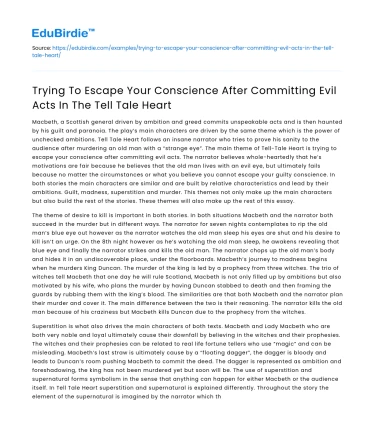Macbeth, a Scottish general driven by ambition and greed commits unspeakable acts and is then haunted by his guilt and paranoia. The play’s main characters are driven by the same theme which is the power of unchecked ambitions. Tell Tale Heart follows an insane narrator who tries to prove his sanity to the audience after murdering an old man with a “strange eye”. The main theme of Tell-Tale Heart is trying to escape your conscience after committing evil acts. The narrator believes whole-heartedly that he’s motivations are fair because he believes that the old man lives with an evil eye, but ultimately fails because no matter the circumstances or what you believe you cannot escape your guilty conscience. In both stories the main characters are similar and are built by relative characteristics and lead by their ambitions. Guilt, madness, superstition and murder. This themes not only make up the main characters but also build the rest of the stories. These themes will also make up the rest of this essay.
The theme of desire to kill is important in both stories. In both situations Macbeth and the narrator both succeed in the murder but in different ways. The narrator for seven nights contemplates to rip the old man’s blue eye out however as the narrator watches the old man sleep his eyes are shut and his desire to kill isn’t an urge. On the 8th night however as he’s watching the old man sleep, he awakens revealing that blue eye and finally the narrator strikes and kills the old man. The narrator chops up the old man’s body and hides it in an undiscoverable place, under the floorboards. Macbeth’s journey to madness begins when he murders King Duncan. The murder of the king is led by a prophecy from three witches. The trio of witches tell Macbeth that one day he will rule Scotland, Macbeth is not only filled up by ambitions but also motivated by his wife, who plans the murder by having Duncan stabbed to death and then framing the guards by rubbing them with the king’s blood. The similarities are that both Macbeth and the narrator plan their murder and cover it. The main difference between the two is their reasoning. The narrator kills the old man because of his craziness but Macbeth kills Duncan due to the prophecy from the witches.
Save your time!
We can take care of your essay
- Proper editing and formatting
- Free revision, title page, and bibliography
- Flexible prices and money-back guarantee
Superstition is what also drives the main characters of both texts. Macbeth and Lady Macbeth who are both very noble and loyal ultimately cause their downfall by believing in the witches and their prophesies. The witches and their prophesies can be related to real life fortune tellers who use “magic” and can be misleading. Macbeth’s last straw is ultimately cause by a “floating dagger”, the dagger is bloody and leads to Duncan’s room pushing Macbeth to commit the deed. The dagger is represented as ambition and foreshadowing, the king has not been murdered yet but soon will be. The use of superstition and supernatural forms symbolism in the sense that anything can happen for either Macbeth or the audience itself. In Tell Tale Heart superstition and supernatural is explained differently. Throughout the story the element of the supernatural is imagined by the narrator which the audience realizes. Supernatural is mainly used to create an unreliable narrator by highlighting the narrator’s delusions and irritational denial “why will you say that I am mad?”.
The final theme which is arguably the main point of both stories is guilt. In both texts guilt is used as a way of comeuppance after both protagonists commit evil acts. In Tell Tale Heart guilt is what leads to the narrator being caught and ultimately leads to his demise. After the narrator kills the old man, he shows guilt in many instances. Throughout the text the narrator’s point of view is shown to show that he cannot take the guilt anymore, finally he snaps “villains! I shrieked, dissemble no more! I admit the deed...”. the narrator’s guilt turns into further madness as he hears the old man’s heart beating but in no way could it be beating since the old man is dead. In Macbeth his guilt is shown right away when after killing Duncan Macbeth’s senses are heightened and paranoid. “How is it with me, when every noise appals me?” Macbeth uses a metaphor to compare his guilt for killing Duncan he believes that there is not enough water in the ocean to clean the blood from his hands.
There are many similarities and differences between the two texts when comparing both. Both texts share similar plot points and themes as the main characters commit murder and are then haunted by their guilt and conscience. The main difference is that they are driven by different motives, Macbeth is driven by ambitions and the narrator by madness.
Did you like this example?
Make sure you submit a unique essay
Our writers will provide you with an essay sample written from scratch: any topic, any deadline, any instructions.
Cite this paper
-
APA
-
MLA
-
Harvard
-
Vancouver
Escaping Conscience in Tell Tale Heart.
(2022, March 17). Edubirdie. Retrieved March 5, 2025, from https://hub.edubirdie.com/examples/trying-to-escape-your-conscience-after-committing-evil-acts-in-the-tell-tale-heart/
“Escaping Conscience in Tell Tale Heart.” Edubirdie, 17 Mar. 2022, hub.edubirdie.com/examples/trying-to-escape-your-conscience-after-committing-evil-acts-in-the-tell-tale-heart/
Escaping Conscience in Tell Tale Heart. [online].
Available at: <https://hub.edubirdie.com/examples/trying-to-escape-your-conscience-after-committing-evil-acts-in-the-tell-tale-heart/> [Accessed 5 Mar. 2025].
Escaping Conscience in Tell Tale Heart [Internet]. Edubirdie.
2022 Mar 17 [cited 2025 Mar 5].
Available from: https://hub.edubirdie.com/examples/trying-to-escape-your-conscience-after-committing-evil-acts-in-the-tell-tale-heart/
copy






 Stuck on your essay?
Stuck on your essay?

